8 start with R start with R
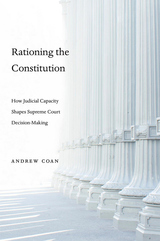
In this groundbreaking analysis of Supreme Court decision-making, Andrew Coan explains how judicial caseload shapes the course of American constitutional law and the role of the Court in American society.
Compared with the vast machinery surrounding Congress and the president, the Supreme Court is a tiny institution that can resolve only a small fraction of the constitutional issues that arise in any given year. Rationing the Constitution shows that this simple yet frequently ignored fact is essential to understanding how the Supreme Court makes constitutional law.
Due to the structural organization of the judiciary and certain widely shared professional norms, the capacity of the Supreme Court to review lower-court decisions is severely limited. From this fact, Andrew Coan develops a novel and arresting theory of Supreme Court decision-making. In deciding cases, the Court must not invite more litigation than it can handle. On many of the most important constitutional questions—touching on federalism, the separation of powers, and individual rights—this constraint creates a strong pressure to adopt hard-edged categorical rules, or defer to the political process, or both.
The implications for U.S. constitutional law are profound. Lawyers, academics, and social activists pursuing social reform through the courts must consider whether their goals can be accomplished within the constraints of judicial capacity. Often the answer will be no. The limits of judicial capacity also substantially constrain the Court’s much touted—and frequently lamented—power to overrule democratic majorities. As Rationing the Constitution demonstrates, the Supreme Court is David, not Goliath.
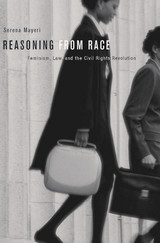
Informed in 1944 that she was “not of the sex” entitled to be admitted to Harvard Law School, African American activist Pauli Murray confronted the injustice she called “Jane Crow.” In the 1960s and 1970s, the analogies between sex and race discrimination pioneered by Murray became potent weapons in the battle for women’s rights, as feminists borrowed rhetoric and legal arguments from the civil rights movement. Serena Mayeri’s Reasoning from Race is the first book to explore the development and consequences of this key feminist strategy.
Mayeri uncovers the history of an often misunderstood connection at the heart of American antidiscrimination law. Her study details how a tumultuous political and legal climate transformed the links between race and sex equality, civil rights and feminism. Battles over employment discrimination, school segregation, reproductive freedom, affirmative action, and constitutional change reveal the promise and peril of reasoning from race—and offer a vivid picture of Pauli Murray, Ruth Bader Ginsburg, and others who defined feminists’ agenda.
Looking beneath the surface of Supreme Court opinions to the deliberations of feminist advocates, their opponents, and the legal decision makers who heard—or chose not to hear—their claims, Reasoning from Race showcases previously hidden struggles that continue to shape the scope and meaning of equality under the law.
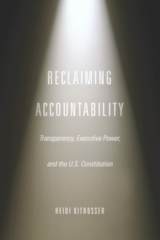
In Reclaiming Accountability, Kitrosser traces presidentialism from its start as part of a decades-old legal movement through its appearance during the Bush and Obama administrations, demonstrating its effects on secrecy throughout. Taking readers through the key presidentialist arguments—including “supremacy” and “unitary executive theory”—she explains how these arguments misread the Constitution in a way that is profoundly at odds with democratic principles. Kitrosser’s own reading offers a powerful corrective, showing how the Constitution provides myriad tools, including the power of Congress and the courts to enforce checks on presidential power, through which we could reclaim government accountability.
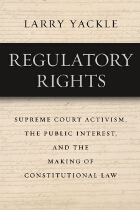
Traversing a wide range of Supreme Court decisions that established crucial precedents about racial discrimination, the death penalty, and sexual freedom, Yackle contends that the rights we enjoy are neither more nor less than what the justices choose to make of them. Regulatory Rights is a bracing read that will be heatedly debated by all those interested in constitutional law and the judiciary.
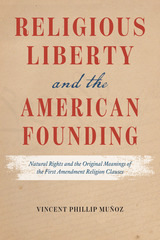
The Founders understood religious liberty to be an inalienable natural right. Vincent Phillip Muñoz explains what this means for church-state constitutional law, uncovering what we can and cannot determine about the original meanings of the First Amendment’s Religion Clauses and constructing a natural rights jurisprudence of religious liberty.
Drawing on early state constitutions, declarations of religious freedom, Founding-era debates, and the First Amendment’s drafting record, Muñoz demonstrates that adherence to the Founders’ political philosophy would lead neither to consistently conservative nor consistently liberal results. Rather, adopting the Founders’ understanding would lead to a minimalist church-state jurisprudence that, in most cases, would return authority from the judiciary to the American people. Thorough and convincing, Religious Liberty and the American Founding is key reading for those seeking to understand the Founders’ political philosophy of religious freedom and the First Amendment Religion Clauses.

Although constitutional law is supposed to be fixed and enduring, its central narrative in the twentieth century has been one of radical reinterpretation--Brown v. Board of Education, Roe v. Wade, Bush v. Gore. What, if anything, justifies such radical reinterpretation? How does it work doctrinally? What, if anything, structures it or limits it?
Jed Rubenfeld finds a pattern in American constitutional interpretation that answers these questions convincingly. He posits two different understandings of how constitutional rights would apply or not apply to particular legislation. One is that a right would be violated if certain laws were passed. The other is that a right would not be violated. He calls the former "Application Understandings" and the latter "No-Application Understandings." He finds that constitutional law has almost always adhered to all of the original Application Understandings, but where it has departed from history, as it did in the Brown decision, it has departed from No-Application Understandings. Specifically, the Fourteenth Amendment did not prohibit racial segregation, so Rubenfeld argues that the Supreme Court had no problem reinterpreting it to prohibit it. It was a No-Application Understanding.
This is a powerful argument that challenges current theories of constitutional interpretation from Bork to Dworkin. It rejects simplistic originalism, but restores historicity to constitutional theorizing.
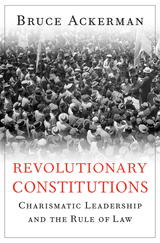
A robust defense of democratic populism by one of America’s most renowned and controversial constitutional scholars—the award-winning author of We the People.
Populism is a threat to the democratic world, fuel for demagogues and reactionary crowds—or so its critics would have us believe. But in his award-winning trilogy We the People, Bruce Ackerman showed that Americans have repeatedly rejected this view. Now he draws on a quarter century of scholarship in this essential and surprising inquiry into the origins, successes, and threats to revolutionary constitutionalism around the world. He takes us to India, South Africa, Italy, France, Poland, Burma, Israel, and Iran and provides a blow-by-blow account of the tribulations that confronted popular movements in their insurgent campaigns for constitutional democracy. Despite their many differences, populist leaders such as Nehru, Mandela, and de Gaulle encountered similar dilemmas at critical turning points, and each managed something overlooked but essential. Rather than deploy their charismatic leadership to retain power, they instead used it to confer legitimacy to the citizens and institutions of constitutional democracy.
Ackerman returns to the United States in his last chapter to provide new insights into the Founders’ acts of constitutional statesmanship as they met very similar challenges to those confronting populist leaders today. In the age of Trump, the democratic system of checks and balances will not survive unless ordinary citizens rally to its defense. Revolutionary Constitutions shows how activists can learn from their predecessors’ successes and profit from their mistakes, and sets up Ackerman’s next volume, which will address how elites and insiders co-opt and destroy the momentum of revolutionary movements.

READERS
Browse our collection.
PUBLISHERS
See BiblioVault's publisher services.
STUDENT SERVICES
Files for college accessibility offices.
UChicago Accessibility Resources
home | accessibility | search | about | contact us
BiblioVault ® 2001 - 2024
The University of Chicago Press









